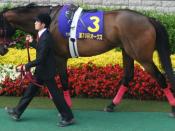Maximizing Life Everyday people go through their lives hoping to achieve something, whether it is to make it to the next day, or to make a million dollars. Even when it is not realized, people's action are always determined by what they believed they will get from them. Everyone has goals even if they are not able to recognize them. In the same vein, each character in the novel Banker, was motivated by his own desire, whether it be fame, fortune, or love. Characters such as Tim, Calder, and Dissidale calculated every move they made on how much closer it would get them to where they wanted to be in life.
Tim Eckertain's main desires were money, love, and friendship. In his work life as a banker, Tim's life was focused on determining which prospective investments would be profitable and which would lose money. Each day, Tim spent hours looking at loan requests, trying to pinpoint exactly who would be able to make him and his bank money. For example, when determining whether to give a loan to a young cartoonist, Tim spent weeks reviewing his work and visiting him in his studio, before deciding that he would most likely be successful. Tim conducted thorough research in order to ensure that he and the bank would not loose money. His goal here was simple, to make the largest monetary profit possible.
Tim realized that in order to make the most out of his life he needed friends, family, and love as well as money. For Tim, attaining friends and love was not a straightforward of a task. To his great disappointment, Tim fell in love with his colleague and good friend's wife Judith. More than anything he wanted to be with her; he loved spending time with her and knew that he would be happy with her as his wife. Tim knew that his feelings were far from unrequited. Her longing looks and the slightly too friendly comments clued him in to what he already hoped she felt. But, as someone who faced reality and looked at the whole picture, Tim tried never to get carried away with his feelings for Judith. Judith's husband was not only his partner, but his friend. Tim looked at all sides of the situation and realized that by getting caught up in his feelings for Judith he would negatively effect the rest of his life. He would not only loose respect in the work place for stealing another's wife, but would loose one of the only true friends he had.
Like Tim, Calder Jackson's actions were always deliberate. His desire for fame, and the fortune that comes with it, inspired every move Calder made. Calder was a well-known "horse-healer."ÃÂ He cared for sick horses that no ordinary veterinarian could help and simply by the touch of his hand made them better; or so he made people believe. Calder's desire for fame was so strong that he was willing to hurt innocent people and animals to achieve his success. His scheme was working magnificently until Tim realized the lies Calder perpetuated. Even in the midst of being found out, Calder continued to believed that he would be able to deceive people and make them trust the fact that he was a true healer.
Calder's desire to maximize his profit ended in self-defeat. When something happened that got in the way of his lies Calder, instead of realizing that his hurting people could also hurt him, did all he could to destroy whatever or whoever was in his way. Calder's desire for fame kept him from facing the reality of life. Because of this, his plans dissolved and he wound up killing two people, attempting to kill another, and then finally, in his last cry of desperation killing himself.
In contrast to Tim and Calder, Dissadale Smith never looked far enough in to the future, to ensure he was making then right decision. Dissadale's entire being was centered on the accumulation of wealth. Although he had more than he could ever use, Dissadale constantly took risks that had the potential to ruin him financially. The first example of this is when he bet his entire fortune on Sandcastle's winning a race because Calder had a hunch that he would. Dissadale took this risk because of the possibility of doubling his estate.
Dissadale risked his fortune a second time on Calder's word. When Calder had found no other way of obtaining sick horses that he could "heal"ÃÂ he asked Dissadale to buy certain horses and then send the horse to him to be healed. Dissadale, not knowing the way in which Calder worked, risked a substantial amount of money on the possibility that Calder may make him a huge profit. Dissadale's problem was that he avoided reality by focusing on he potential profit, he never looked at the consequences of failing, or examined the risk of his investment. Dissadale seemed to be not only motivated by money, but by the "high"ÃÂ that he got from taking such huge risks.
Each character in this novel was motivated by something unique, whether it be money, respect or love. All three men had to make choices every day in order to best achieve their goals. They all looked at how each move they made could bring them closer to their goals, and had to decide whether to make a decision based on an educated guess. Tim was a sound-minded man who truly thought out his decisions and did his best to attain his goals. Tim was successful because he was able to look at the long-term consequences of his immediate actions and avoid the short term gratification.
Calder, on the other hand, thought about what he was doing, but could not examine whether his choices brought him to his true desires of fame and fortune, which he equated with respect. He lost focus on his goals and saw the world myopically. With out the vision to face reality, and a true understanding of how to get what he wanted, his behavior caused destruction, pain and death.
Dissadale didn't think about the long or short-term consequences of his actions, and constantly had to worry about whether he made the right or wrong choice. A man who truly desired money would, like Tim, evaluate the risks in each investment. Thus, we must wonder whether Dissadale's true desire was for money or, did he was motivated by the high he got through taking risks or, was he, like Calder, so blinded by his desire for money that he was unable to see reality.
All three of these men were motivated by the possibility that there actions and the time they put into them would eventually help to give them what they wanted. The three men's differing abilities to think about long and short-term goals and their ability to resist immediate gratification were the significant factors in their success or destruction.




